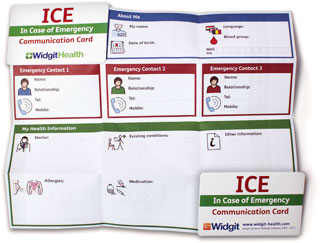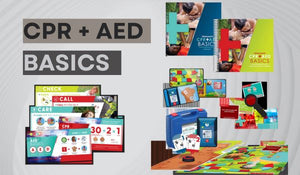ICE Card and Dementia Induced Wandering
[caption id="attachment_1039" align="alignleft" width="290"] Widgit's ICE Card folds up to easily fit in a wallet's credit card slot.[/caption]
The Alzheimer's Society of Ontario (ALSO) is launching a new awareness campaign addressing the problem of individuals with dementia wandering from home, (see the story on CTV News here). According to the Society "3 out of five people with dementia become lost at some point, often without warning." (See ALSO's Finding Your Way site)
The Society, on their Finding Your Way pages, has great strategies for reducing the chance of someone wandering off. The Society also provide suggestions for ways to mitigate the crisis of losing a loved one such as using a Medic-Alert Bracelet and/or electronic locating solutions. The In Case of Emergency or (ICE) Card (which Bridges is bringing to Canada from the UK in the next few weeks) is another simple, but low cost option that delivers immediate support in a crisis.
[caption id="attachment_1035" align="alignleft" width="320"]
Widgit's ICE Card folds up to easily fit in a wallet's credit card slot.[/caption]
The Alzheimer's Society of Ontario (ALSO) is launching a new awareness campaign addressing the problem of individuals with dementia wandering from home, (see the story on CTV News here). According to the Society "3 out of five people with dementia become lost at some point, often without warning." (See ALSO's Finding Your Way site)
The Society, on their Finding Your Way pages, has great strategies for reducing the chance of someone wandering off. The Society also provide suggestions for ways to mitigate the crisis of losing a loved one such as using a Medic-Alert Bracelet and/or electronic locating solutions. The In Case of Emergency or (ICE) Card (which Bridges is bringing to Canada from the UK in the next few weeks) is another simple, but low cost option that delivers immediate support in a crisis.
[caption id="attachment_1035" align="alignleft" width="320"] Widgit ICE Card from Bridges unfolded.[/caption]
The ICE Card has all the essential information an individual should share in order to be reunited with love ones and to communicate vital medical information on the spot -- such as a heart condition, diabetes, blood pressure etc. Aphasia is a common condition of those with forms of dementia. In addition if someone is dehydrated, suffering from exposure/hypothermia or disoriented, (stroke, insulin shock etc.) the ICE Card offers a quick and simple way to communicate immediate medical needs clearly and effectively.
EMS, ER staff, police and other First Responders are trained to look in a wallet for vital information. The ICE Card is small enough to slip into the credit card slot inside your wallet.
This is assuming of course, that the individual takes their wallet with them. Many caregivers and loved ones of individuals with dementia (myself included) will tell you that the physical habit of taking a wallet or a purse can be very deeply ingrained.
In the case of my dad, he sometimes has trouble recognizing me but he still reaches for his wallet on the dresser in the front hall, each time he goes to step-out the door. Caregivers often report that their loved one might forget to put on a coat on a winter's day but they won't leave without their wallet or purse.
Of course since it only costs a few dollars, another option is to keep an ICE Card into the pockets of coats, jackets or other common pieces of clothing, just in case.
The ICE Card has been available in the UK for almost 2 years, but we've just localized it for Canada and hope to be getting our first few copies in a matter of weeks.
[caption id="attachment_1036" align="alignleft" width="320"]
Widgit ICE Card from Bridges unfolded.[/caption]
The ICE Card has all the essential information an individual should share in order to be reunited with love ones and to communicate vital medical information on the spot -- such as a heart condition, diabetes, blood pressure etc. Aphasia is a common condition of those with forms of dementia. In addition if someone is dehydrated, suffering from exposure/hypothermia or disoriented, (stroke, insulin shock etc.) the ICE Card offers a quick and simple way to communicate immediate medical needs clearly and effectively.
EMS, ER staff, police and other First Responders are trained to look in a wallet for vital information. The ICE Card is small enough to slip into the credit card slot inside your wallet.
This is assuming of course, that the individual takes their wallet with them. Many caregivers and loved ones of individuals with dementia (myself included) will tell you that the physical habit of taking a wallet or a purse can be very deeply ingrained.
In the case of my dad, he sometimes has trouble recognizing me but he still reaches for his wallet on the dresser in the front hall, each time he goes to step-out the door. Caregivers often report that their loved one might forget to put on a coat on a winter's day but they won't leave without their wallet or purse.
Of course since it only costs a few dollars, another option is to keep an ICE Card into the pockets of coats, jackets or other common pieces of clothing, just in case.
The ICE Card has been available in the UK for almost 2 years, but we've just localized it for Canada and hope to be getting our first few copies in a matter of weeks.
[caption id="attachment_1036" align="alignleft" width="320"] The reverse side of the unfolded ICE Card, with quick communication tool.[/caption]
Created by Widgit, a company that has been crafting a 40,000 word symbol vocabulary to aid written and spoken communication for over 20 years, the ICE Card offers more than a hand written note in the wallet. It also has a symbol supported communication board to aid in communication even if the individual is non-verbal or needs visuals to help understand what is being communicated to them; whether due to a cognitive challenge, hearing problem, or because they're a non-English speaker.
The ICE Card is just one of many research-based symbol supported Widgit Health communication products published in Canada by Bridges. Other's include the Patient Communication sheet for hospital bedsides, the First Response Communication Book for professional emergency service providers and the First Aid Communication Booklet.
For more information on the ICE Card contact Bridges.
-- Bogdan Pospielovsky,
The reverse side of the unfolded ICE Card, with quick communication tool.[/caption]
Created by Widgit, a company that has been crafting a 40,000 word symbol vocabulary to aid written and spoken communication for over 20 years, the ICE Card offers more than a hand written note in the wallet. It also has a symbol supported communication board to aid in communication even if the individual is non-verbal or needs visuals to help understand what is being communicated to them; whether due to a cognitive challenge, hearing problem, or because they're a non-English speaker.
The ICE Card is just one of many research-based symbol supported Widgit Health communication products published in Canada by Bridges. Other's include the Patient Communication sheet for hospital bedsides, the First Response Communication Book for professional emergency service providers and the First Aid Communication Booklet.
For more information on the ICE Card contact Bridges.
-- Bogdan Pospielovsky,
 Widgit's ICE Card folds up to easily fit in a wallet's credit card slot.[/caption]
The Alzheimer's Society of Ontario (ALSO) is launching a new awareness campaign addressing the problem of individuals with dementia wandering from home, (see the story on CTV News here). According to the Society "3 out of five people with dementia become lost at some point, often without warning." (See ALSO's Finding Your Way site)
The Society, on their Finding Your Way pages, has great strategies for reducing the chance of someone wandering off. The Society also provide suggestions for ways to mitigate the crisis of losing a loved one such as using a Medic-Alert Bracelet and/or electronic locating solutions. The In Case of Emergency or (ICE) Card (which Bridges is bringing to Canada from the UK in the next few weeks) is another simple, but low cost option that delivers immediate support in a crisis.
[caption id="attachment_1035" align="alignleft" width="320"]
Widgit's ICE Card folds up to easily fit in a wallet's credit card slot.[/caption]
The Alzheimer's Society of Ontario (ALSO) is launching a new awareness campaign addressing the problem of individuals with dementia wandering from home, (see the story on CTV News here). According to the Society "3 out of five people with dementia become lost at some point, often without warning." (See ALSO's Finding Your Way site)
The Society, on their Finding Your Way pages, has great strategies for reducing the chance of someone wandering off. The Society also provide suggestions for ways to mitigate the crisis of losing a loved one such as using a Medic-Alert Bracelet and/or electronic locating solutions. The In Case of Emergency or (ICE) Card (which Bridges is bringing to Canada from the UK in the next few weeks) is another simple, but low cost option that delivers immediate support in a crisis.
[caption id="attachment_1035" align="alignleft" width="320"] Widgit ICE Card from Bridges unfolded.[/caption]
The ICE Card has all the essential information an individual should share in order to be reunited with love ones and to communicate vital medical information on the spot -- such as a heart condition, diabetes, blood pressure etc. Aphasia is a common condition of those with forms of dementia. In addition if someone is dehydrated, suffering from exposure/hypothermia or disoriented, (stroke, insulin shock etc.) the ICE Card offers a quick and simple way to communicate immediate medical needs clearly and effectively.
EMS, ER staff, police and other First Responders are trained to look in a wallet for vital information. The ICE Card is small enough to slip into the credit card slot inside your wallet.
This is assuming of course, that the individual takes their wallet with them. Many caregivers and loved ones of individuals with dementia (myself included) will tell you that the physical habit of taking a wallet or a purse can be very deeply ingrained.
In the case of my dad, he sometimes has trouble recognizing me but he still reaches for his wallet on the dresser in the front hall, each time he goes to step-out the door. Caregivers often report that their loved one might forget to put on a coat on a winter's day but they won't leave without their wallet or purse.
Of course since it only costs a few dollars, another option is to keep an ICE Card into the pockets of coats, jackets or other common pieces of clothing, just in case.
The ICE Card has been available in the UK for almost 2 years, but we've just localized it for Canada and hope to be getting our first few copies in a matter of weeks.
[caption id="attachment_1036" align="alignleft" width="320"]
Widgit ICE Card from Bridges unfolded.[/caption]
The ICE Card has all the essential information an individual should share in order to be reunited with love ones and to communicate vital medical information on the spot -- such as a heart condition, diabetes, blood pressure etc. Aphasia is a common condition of those with forms of dementia. In addition if someone is dehydrated, suffering from exposure/hypothermia or disoriented, (stroke, insulin shock etc.) the ICE Card offers a quick and simple way to communicate immediate medical needs clearly and effectively.
EMS, ER staff, police and other First Responders are trained to look in a wallet for vital information. The ICE Card is small enough to slip into the credit card slot inside your wallet.
This is assuming of course, that the individual takes their wallet with them. Many caregivers and loved ones of individuals with dementia (myself included) will tell you that the physical habit of taking a wallet or a purse can be very deeply ingrained.
In the case of my dad, he sometimes has trouble recognizing me but he still reaches for his wallet on the dresser in the front hall, each time he goes to step-out the door. Caregivers often report that their loved one might forget to put on a coat on a winter's day but they won't leave without their wallet or purse.
Of course since it only costs a few dollars, another option is to keep an ICE Card into the pockets of coats, jackets or other common pieces of clothing, just in case.
The ICE Card has been available in the UK for almost 2 years, but we've just localized it for Canada and hope to be getting our first few copies in a matter of weeks.
[caption id="attachment_1036" align="alignleft" width="320"] The reverse side of the unfolded ICE Card, with quick communication tool.[/caption]
Created by Widgit, a company that has been crafting a 40,000 word symbol vocabulary to aid written and spoken communication for over 20 years, the ICE Card offers more than a hand written note in the wallet. It also has a symbol supported communication board to aid in communication even if the individual is non-verbal or needs visuals to help understand what is being communicated to them; whether due to a cognitive challenge, hearing problem, or because they're a non-English speaker.
The ICE Card is just one of many research-based symbol supported Widgit Health communication products published in Canada by Bridges. Other's include the Patient Communication sheet for hospital bedsides, the First Response Communication Book for professional emergency service providers and the First Aid Communication Booklet.
For more information on the ICE Card contact Bridges.
-- Bogdan Pospielovsky,
The reverse side of the unfolded ICE Card, with quick communication tool.[/caption]
Created by Widgit, a company that has been crafting a 40,000 word symbol vocabulary to aid written and spoken communication for over 20 years, the ICE Card offers more than a hand written note in the wallet. It also has a symbol supported communication board to aid in communication even if the individual is non-verbal or needs visuals to help understand what is being communicated to them; whether due to a cognitive challenge, hearing problem, or because they're a non-English speaker.
The ICE Card is just one of many research-based symbol supported Widgit Health communication products published in Canada by Bridges. Other's include the Patient Communication sheet for hospital bedsides, the First Response Communication Book for professional emergency service providers and the First Aid Communication Booklet.
For more information on the ICE Card contact Bridges.
-- Bogdan Pospielovsky,
- Tags: AAC alzheimers Literacy Symbols
- 9539015







Comments 0